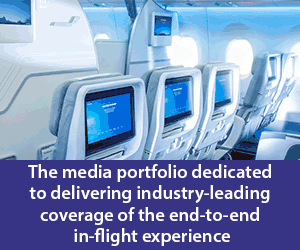A consortium including Williams Advanced Engineering and JPA Design is aiming to develop new lightweight aircraft seats for business class and premium economy using innovative design and manufacturing processes and Formula One-inspired product development.
Williams Advanced Engineering, JPA Design, British Airways and SWS Certification have formed a consortium, supported by Airbus and with funding from the Aerospace Technology Institute (ATI) to develop new lightweight aircraft seat structure capabilities in the UK, hoping to enhance passenger experience and reduce the weight of aircraft, saving airlines fuel and cutting carbon emissions.
The £1.4 million, 18-month research project with the UK’s ATI will progress the seat design to programme entry level maturity and will seek engagement from existing aircraft interior manufacturers to enter production.
The ATI project is led by Williams Advanced Engineering along with core partner JPA Design. British Airways and Airbus will help pull the technology to market, JPA Design will provide concept designs and an already proven monocoque design, currently flying with Singapore Airlines, while SWS Certification will guide towards regulatory approvals, and Williams Advanced Engineering will help build the UK supply chain for composite structures.
“Lightweight and safe components are crucial for success in motorsport and our team is excited to have the opportunity to translate these capabilities into saving airlines carbon emissions and costs,” said Craig Wilson, managing director of Williams Advanced Engineering. “Working with industry leaders as well as the ATI in this consortium offers significant benefits to aviation and the UK economy.”
The consortium aim to design and develop the new seat structures for manufacture using a combination of innovative manufacturing processes, design approaches and incorporating background intellectual property (IP) from the companies involved.
This process could reduce the bill of material (BOM) count, the consortium argue, delivering lower cost, lightweight and reconfigurable seating structures for aircraft, incorporating recycled materials and using rapid Formula One-inspired product development to lead to new UK manufacturing business growth in seat structures for supply to a range of global aircraft seat manufacturers and airframers.
With aircraft manufacturers and airlines valuing lighter weight interiors offering improved fuel economy, enabling operators to save money, increase route range or pass on weight capacity as a customer offer – the consortium see an opportunity to create a new UK seat structures manufacturing business that combines technologies and the latest manufacturing process, drawing on experience of designing lightweight structures in the performance automotive sector.
“Combining Formula One technology, world class design and a laser-like focus on safety across this consortium will deliver significant enhancements for airlines, passengers and the environment,” said Nigel Smith, Managing Director of SWS Certification. “We look forward to playing a crucial role in delivering these innovative, safe new products that seek to revolutionise aircraft interiors for global benefit.”
Research suggests commercial aircraft are set to double over the next 20 years, and the interiors market is valued at $14.6bn for new-build aircraft and retrofit. With business class seating attracting most innovation investment, this is where the project will initially focus.
The consortium says its business class seat structures will be 4kg lighter on average, with a version for premium economy offering a 2kg weight and space saving solution.
Due to advanced tooling and manufacturing methods the consortium also expects its products to be cost neutral compared to the competition.
The group argues that replacing existing technology with lighter products could prevent significant amounts of carbon emissions, as well as reducing costs, and suggest that by replacing all business class seats with a lighter product (eg. a 4kg weight saving per seat) on 12 long-haul aircraft, such as the Airbus A350 translates to saving 942,000kg of CO2 and $195,600 in fuel per year.
The design approach for the new seat structures is to develop a product that could fit across multiple platforms, such as the Airbus A320, A330 and A350.
“The UK has a strong existing industrial base for aircraft seat manufacture and an industrial strategy that highlights composites capability as a key area for development,” commented James Park, founder and principal of JPA Design. “This aligns to the ATI’s strategic outlook, creating products ready for the next-generation of aircraft.”
He added that JPA’s designs and products such as the lightweight monocoque seating system, “which allows for fewer parts, lower cost of manufacture, faster production time, lower maintenance and lower cost of ownership, as well as increased passenger space and comfort, will benefit significantly from the work of this consortium in turn providing enhanced opportunities for our airline customers.”







